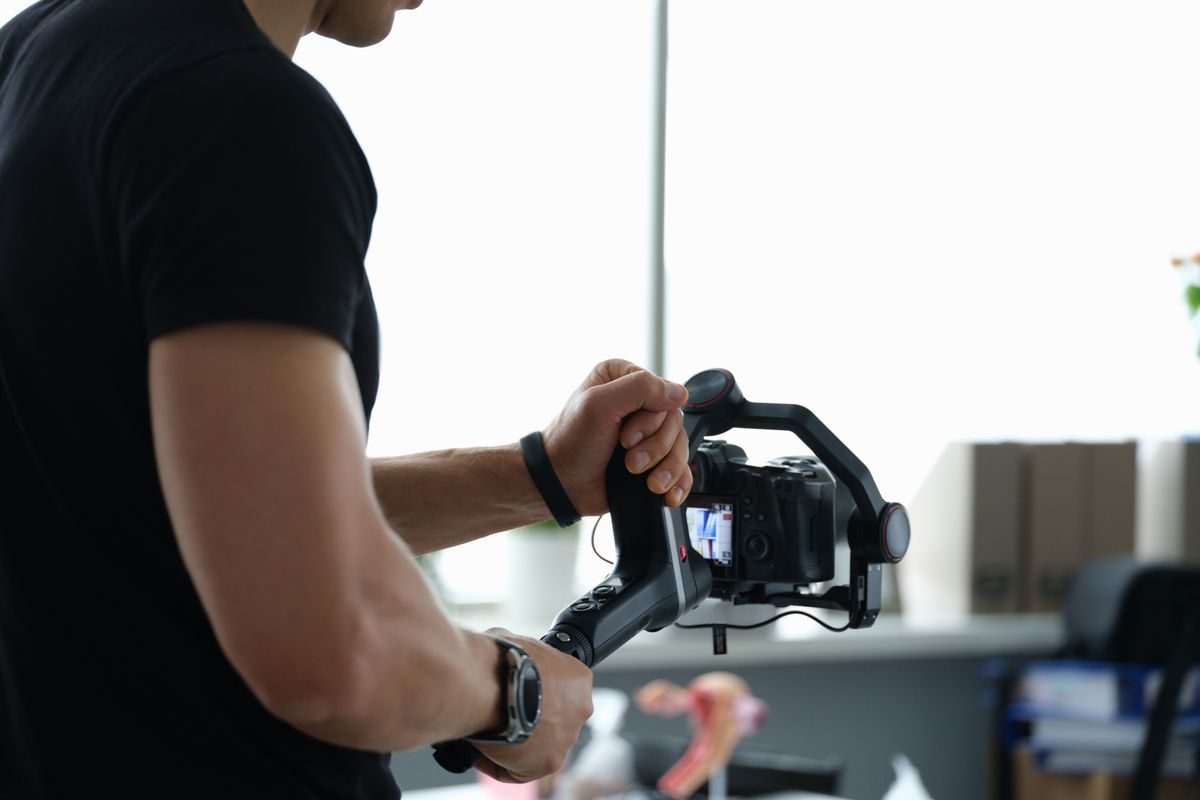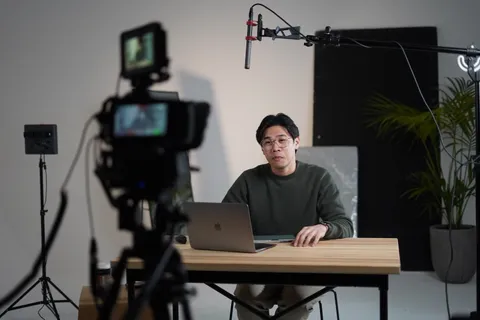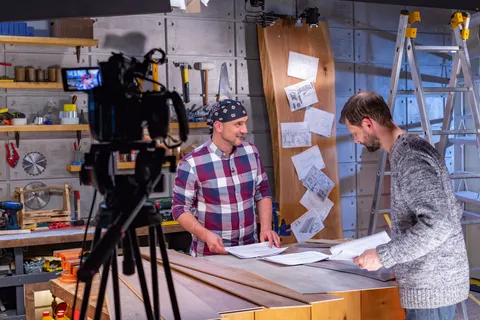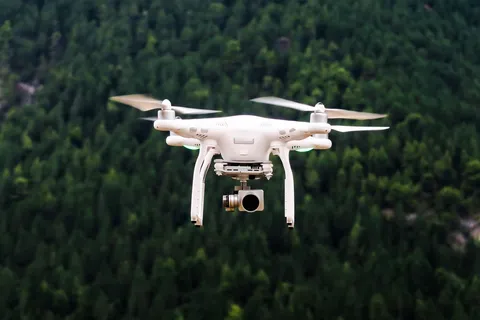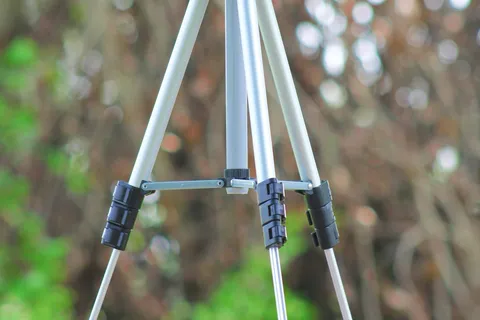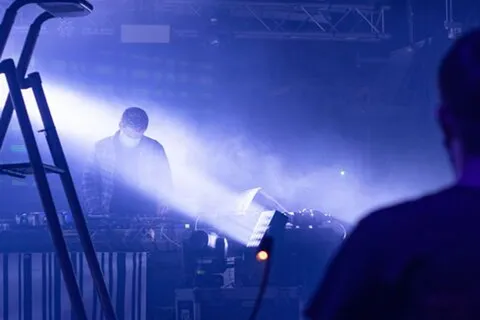How to Choose a Good Professional Video Camera? - Are you getting started with making videos professionally? The most important thing you'll need is a good camera. Whether you're making cool movies or recording real-life stuff for a documentary, having the right camera is super important. We're here to help you choose the best one for your job. And if you're in Melbourne and want some advice, we've got a suggestion for you. Let's get started!
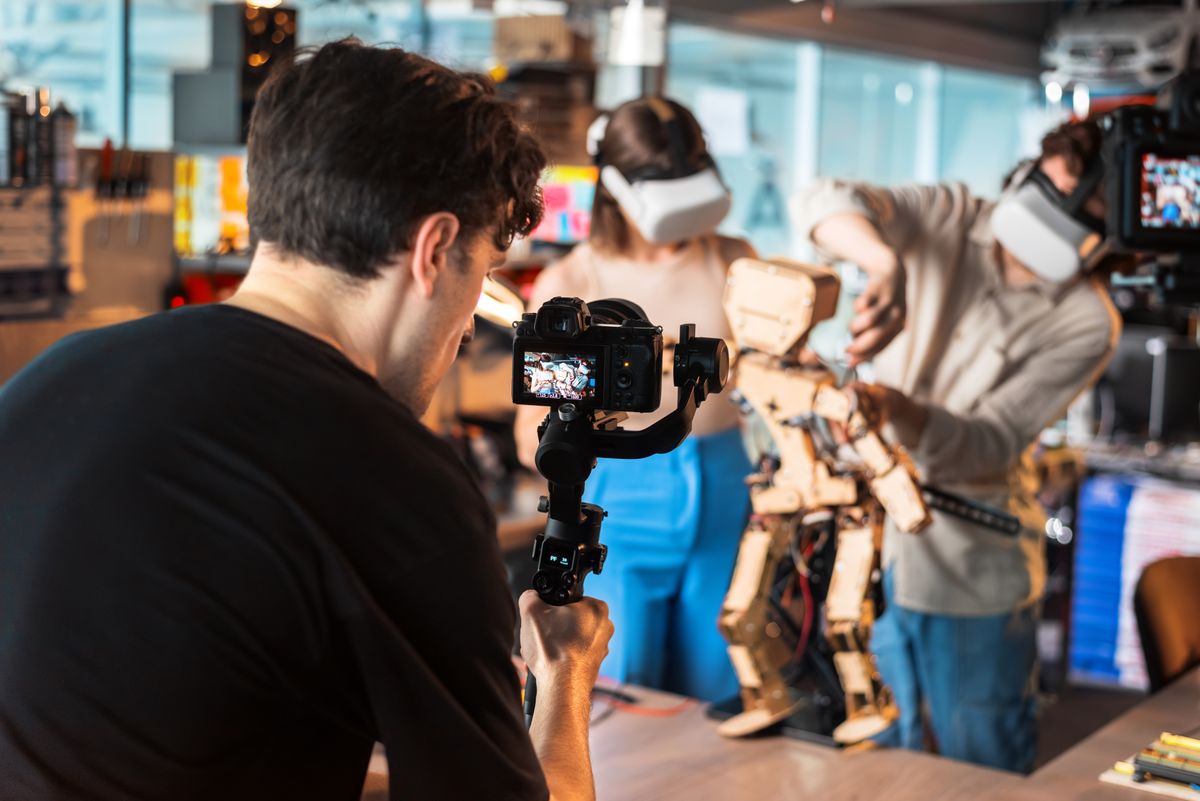
Figure Out What You Need for Your Videos
Before you go spending money on a fancy camera, it's important to really understand what you're trying to do. Let's take a closer look at what you should think about:
- Why Are You Filming?
Are you shooting action-packed sports, peaceful nature scenes, or maybe close-up shots of products for an online store? The type of content you're making will determine what features your camera should have. For example, action shots need a camera with a high frame rate, while interviews need a camera that can show colors accurately. - How Clear Do You Want Your Videos?
Everyone talks about 4K video, but you need to decide if you really need it. 4K video looks amazing, but it also takes up a lot of storage space and requires a powerful computer for editing. Sometimes, sticking with 1080p might be enough, especially if you're putting your videos on the internet. - Where Will Your Videos Be Shown?
Think about where people will watch your videos. Will it be on a big movie screen, a projector in a boardroom, a YouTube channel, or just on Instagram stories? Knowing this will help you choose the right resolution and format for your videos. - What Will You Do After Filming?
Consider what you'll do with your footage after you're done shooting. If you want to do fancy color editing, special effects, or advanced transitions, you'll need a camera that can capture a wide range of colors or even RAW footage for more flexibility. - Don't Forget About Sound!
Audio is a big part of the video experience. Think about whether you need to capture background sounds, clear dialogue, or both. Depending on your needs, you might have to use external microphones or adjust your camera's audio settings. - Think About the Future:
Technology changes quickly. Make sure to think about how long you plan to use the camera and whether it will still be good for your needs in the future.
Taking the time to think about these things will help you make sure you don't regret your camera choice later on.
Consider Your Budget
Now, let's talk money. Setting a budget might not be the most exciting part of this process, but it's super important. So, how do you handle the financial side of things without spending all your money on a camera? Let's break it down:
- Know Your Spending Limit:
Like any investment, you need to decide how much you're willing to spend. It's tempting to go all out with the latest technology, but it's important to balance your wants with what you really need. Are you starting a big production company, or is this a solo project? - Think About the Extras:
They don't always mention the "hidden" costs. You might buy the camera, but what about lenses, memory cards, extra batteries, tripods, and carrying cases? These accessories can add up quickly, so make sure you include them in your budget. - Price Doesn't Always Equal Quality:
While more expensive cameras are often better, it's not always a direct relationship. Some mid-range cameras can do just as well in certain situations. Understand what features you absolutely need versus the ones that are nice to have. - Consider Buying Used:
It's okay to look at second-hand equipment. Professionals sometimes sell their almost-new gear when they upgrade, which means you could get a good deal on a camera that's barely been used. Just be sure to check its condition and history thoroughly. - Think About Future Costs:
Think long-term. If you choose a camera system with expensive lenses and accessories, your future expenses could go up. This is an important part of the total cost of owning the camera. - Resale Value Matters:
Some camera brands and models hold their value better than others. If you think you might want to upgrade in the future, it could be worth spending a bit more now on a camera that you can sell for a good price later.
Setting a budget isn't just about protecting your wallet; it also helps you narrow down your options and makes the decision-making process less overwhelming.
Check for Important Features
Now, let's dive into the exciting stuff – the features!
When you're searching for the perfect professional video camera, all the technical terms can be overwhelming. But don't worry, let's focus on what really matters:
- Resolution:
This is a big deal. 4K is the standard now, and it gives you more options in editing, like cropping and zooming without losing quality. But if you're just starting out, 1080p might be enough. Think about where your viewers will watch your videos: on big 4K TVs or small mobile screens? - Low-Light Performance:
Have you ever tried filming in low light and ended up with grainy footage? A camera's ability to perform well in low light can be a game-changer, especially for events or moody shoots. - Frame Rates:
Want to capture smooth slow-motion shots? Look for a camera that can record at high frame rates, like 120fps or even 240fps. - Image Stabilization:
Shaky footage looks unprofessional. Cameras with built-in optical or digital stabilization can save the day, especially if you're shooting without a tripod. - Autofocus:
While manual focus gives you control, a reliable autofocus system can be crucial when capturing fast or unpredictable movements, especially if you're working alone. - Inputs/Outputs:
Think about connecting external microphones or monitors. A good camera should have various input and output options, like HDMI, SDI, and XLR for high-quality audio. - Battery Life:
Imagine running out of battery in the middle of a shot – not fun! Look for a camera with decent battery life, and check if you can use larger batteries or adapters for longer shoots. - Interchangeable Lenses:
If you want to take your videography to the next level, consider cameras with interchangeable lenses. This allows you to adapt to different scenes and styles, from wide-angle shots to close-ups. - User Interface:
Don't underestimate the importance of a user-friendly camera. A well-organized menu system and customizable buttons can make your shooting experience much smoother.
Remember, while features are exciting, make sure they fit your specific needs. Don't get tempted by fancy specs that you might never actually use.
Think About Comfort and Portability
Imagine this : You've just bought a camera with all the latest tech and amazing features. It has fantastic reviews and promises cinematic shots.
But, there's a problem – it feels like you're carrying around a small boulder, and every time you try to press the record button, your fingers get tangled up like in a game of Twister. Not exactly the ideal setup, right?
- Weight and Size:
Especially if you're a filmmaker on the move or capturing events, the weight and size of your camera matter a lot. If you're hiking or covering an all-day event, you don't want to feel like you've just finished an intense arm workout by the end of the day. - Comfortable Handgrip:
This might sound minor until you've held a camera for hours. A comfortable grip can make a big difference, providing stability and reducing fatigue. - Button Placement:
Have you ever missed a great shot because you couldn't find the right button quickly enough? A well-designed button layout that makes sense can speed up your work and reduce frustration on set. - Viewfinder and Screen:
These are like your windows to the world. Check if they are clear and adjustable, and if they work well under different lighting conditions, especially in bright sunlight. - Modularity:
Some cameras are modular, meaning you can add or remove components based on your needs. This is great for those who want flexibility and the option to upgrade parts in the future. - Durability:
If you're an adventurous videographer or often work in challenging conditions, think about how sturdy the camera is. Some models are weather-sealed, which means they can handle a bit of rain or dust without any issues.
Do Your Research and Read Reviews
Okay, so here's the deal: when you're about to spend a lot of money on a professional video camera, you want to make sure it's worth every cent. Think of it like buying a car. You wouldn't just trust what the car salesperson tells you, right?
No way!
You'd do your research, read reviews, and maybe even ask your car-savvy friend for advice.
- Expert Reviews:
Start by checking out what the experts have to say. Websites, magazines, or YouTube channels that focus on videography and filmmaking often have professionals who give detailed insights about the latest camera gear. They go deep, talking about things like sensor quality and battery life. - User Reviews:
This is where you get the real, unfiltered opinions. Users tend to be brutally honest about their experiences. Websites like Amazon, Best Buy, or B&H often have a treasure trove of user reviews. They'll tell you if that one feature actually works as well as the company claims, or if the battery life is just average. - Demo Videos:
Check out platforms like YouTube or Vimeo. Many videographers post videos, unboxings, or full reviews of cameras. It's a great way to see the camera in action and get an idea of its capabilities and any potential issues. - Online Communities:
Join videography forums or Facebook groups. The people in these communities usually know their stuff and are happy to share their experiences, insights, and sometimes even their mistakes. - Try Before You Buy:
Some stores or online platforms let you rent cameras. It can be a fantastic way to get a hands-on test. If you fall in love with the camera from the first shot, you know you're making the right choice. If not, it's back to doing more research. - Seek Advice from Pros:
If you know someone in the industry, don't be shy about asking for their advice. Their real-world experience can give you valuable insights.
Remember, every camera has its strengths and weaknesses. The goal is to find the one that best fits your needs. And when in doubt, trust the wisdom of the community.
.webp)
Meet Vimi: Your Video Production Partner in Melbourne!
Oh, Melbourne – famous for its art, coffee, and us, Vimi! Haven't heard of us before? Let us explain. If you're in business and thinking about making videos (which is a smart move), you'll want a partner who's good with technology, creative, and friendly.
- We Have Lots of Experience: We've been doing this for a long time. We've learned a lot and gotten better over the years.
- We Love Technology: Remember when we talked about picking the right camera? Well, we have the best equipment like cameras, lights, sound stuff, and even drones. We know how to use them to make you look fantastic.
- We're Great at Telling Stories: We're really good at telling stories. We make videos that connect with the people you want to reach, so they remember your message.
- We Know Melbourne Well: Being in Melbourne helps us understand what people here like. Whether you want to reach cool folks in Fitzroy or business people in the CBD, we know how to make videos that connect with them.
- We Work with You: We believe in teamwork. We'll talk to you to understand your brand and what you want to do. Then, we'll use our creative ideas and skills to make a video that's even better.
So, next time you're in Melbourne and think, "I need a video," remember us, Vimi. We're the local experts who turn video ideas into reality.
In today's digital world, a good video can help your business a lot. It can turn viewers into customers and make your business more successful. Choose us for video production in Melbourne, Adelaide, and Sydney, and benefit from our creative ideas and smart thinking.
Frequently Asked Question
What should I think about when figuring out what I need for making videos?
First, decide what kind of videos you want to make. Are they short films, vlogs, business videos, or documentaries? The type of videos you want to create determines what kind of camera you need. Also, think about where you'll be filming – indoors, outdoors, or a mix of both. Knowing these things will help you choose the right camera.
How much money should I spend on a good video camera?
It depends on your budget and what you need. While it's tempting to buy the most expensive camera, there are many cameras available for different budgets and purposes. Decide on a budget range, stick to it, and remember that the best camera for you might not be the most expensive one.
Are there specific things to look for in a good video camera?
Absolutely! Look for features like 4K resolution (which means sharper images), a big sensor, the ability to shoot at high frame rates, and good performance in low light. Also, consider things like how well the camera can focus automatically, its dynamic range, and the types of ports it has for connecting other equipment.
How important is it for a video camera to be comfortable to use?
It's pretty important, especially if you'll be filming for a long time or on the move. A camera that's easy to hold, with buttons and controls in the right places, and a comfortable grip, can make your filming experience a lot better.
Can I trust all the online reviews when I'm researching a camera?
Online reviews are helpful, but it's a good idea to be a little skeptical. Look for reviews from trusted sources and real users. Reading multiple reviews and even asking experts for advice can give you a well-rounded view.
Is it a big deal for a camera to be easy to carry around?
It can be, especially if you're a vlogger who travels a lot or films in different places. A small and light camera can be handy. But make sure it still has the important features you need, even if it's portable.
What's the difference between DSLR and cinema cameras for making videos?
DSLRs are versatile and can be used for both photos and videos. They're usually more portable. Cinema cameras are made specifically for making videos. They offer better video quality, color options, and professional video features.
Why would someone want a camera that shoots in 4K instead of HD?
4K gives you sharper and clearer images because it has more pixels. It also lets you do more in post-production, like cropping or zooming, without losing quality. As 4K becomes more common, having 4K videos can help your work stay up-to-date.
How often should I get a new video camera?
It's not about time; it's about what's new and what you need. If newer cameras have features that would really improve your videos or make your work easier, think about upgrading. Otherwise, a well-maintained camera can last for years.
How does Vimi keep up with the latest video trends?
Vimi is always looking for the newest trends, techniques, and technologies because they want to deliver the best videos. They stay updated by learning and getting the latest equipment. They're like the tech experts who always have the newest gadgets before anyone else!
